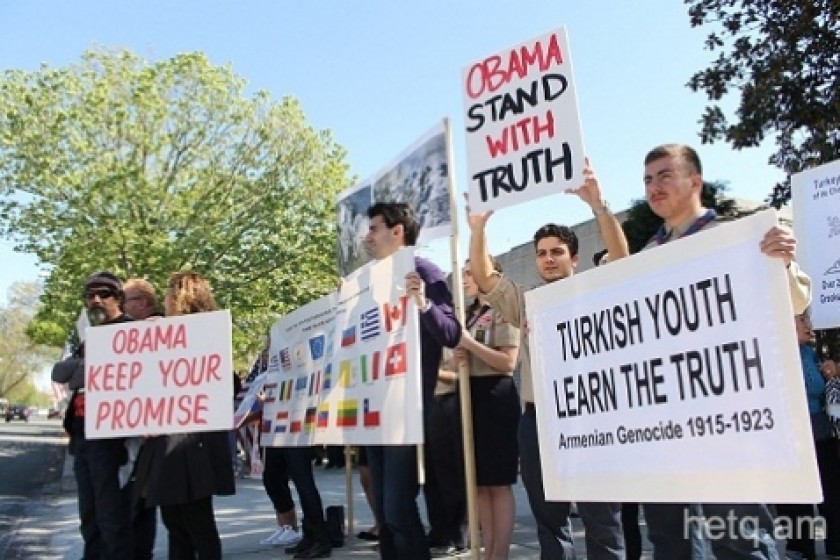
Armenian, Turkish Protestors and Supporters Once Again Face Off on Armenian Genocide Recognition Day
Armenian and Turkish protestors and their supporters once again organized simultaneous demonstrations outside the Turkish Embassy in Washington, D.C., on April 24, the day of the recognition of the Armenian Genocide.
Zabel Sapunjyan says for 44 years she's been living in the US and coming to these protests. She is protesting the governments of Turkey and the US because it is her belief that Turkey continues the crime it committed nearly a century ago in Kessab today, whereas the US government, specifically US President Barack Obama reneged on his promise made to the Armenian people and did not recognize the Armenian Genocide (he once again used the term "Medz Yeghern" in his message).
On April 24, among other Armenian diaspora communities, local Armenians in Washington likewise marked the 99th anniversary of the commemoration of the victims of the Armenian Genocide. There was a crowd outside the Turkish Embassy in the US capital: gathered on the sidewalk across the street were not only members of the Armenian community, but also individuals of various ethnicities supporting them, holding placards with inscriptions critical of the position of Turkey's and US leadership, and on genocide recognition and denial.
Another group was gathered directly in front of the Turkish embassy, holding Turkish flags and placards with anti-Armenian inscriptions. There was also an Azerbaijani flag. This group was playing loud music, including the song "Sari Gelin" of Armenian origin famous in Turkey.
Though there were 150–200 more demonstrators on the Armenian side, the Turkish side made a lot of noise. The Hetq correspondent was informed that the year before last, demonstrators on the Turkish side were again quite loud, singing and dancing — so much so that the Turkish ambassador was issued a warning, and no such thing occurred in 2013. This year, the revelry resumed perhaps due to the ambassador's absence.
Armenian bikers had come to Washington from California and were greeted with enthusiasm by demonstrators on the Armenian side. They later drove on the side of the Turkish embassy, provoking the demonstrators on that side of the street, which the latter obviously didn't appreciate and shouted at them in Turkish.
Demonstrator Zabel Sapunjyan (pictured, center) says the Turks want to cover up their lying with the same lie, adding that being afraid of the recognition of the rights of Armenians, the Turks are taking the path of denial.
"Unfortunately, President Obama is playing with words. He knows the history well — he said it when he was senator, but now Turkey isn't allowing the use of other words. US diplomacy and the Armenian Genocide were written in Ankara. This is shameful. The Americans have to have their own policies," says another protestor, Armenian National Committee of America Executive Director Aram Hamparian.
An official from the US Department of State, in conversation with Hetq, said the president was quite clear that 1.5 million Armenians were killed, and that it was one of the worse atrocities. Asked why Obama uses the term Medz Yeghern instead of the internationally recognized word genocide, the official gave an elusive response, at the same time saying that the use of this term already speaks to the clear position of the US on this issue. The official added that the US urges Armenia and Turkey to finally normalize their relations, from which both can only gain. Asked why the US, one of the promoters of the reconciliation process and advocate of the Armenian -Turkish Protocols, does not now urge Turkey to take clear steps to ratify the Protocols, and whether what was important for the US was only the fact of the signing, the US State Department official said they rarely participate purely to participate, but he didn't elaborate as to why the US doesn't take practical steps to finally implement the rapprochement it sponsored. Instead, according to him, it is still too early to speak about the failure of the process, and it's not over yet.
Aram Hamparian says this protest shows Turkey that Armenians haven't forgotten their history, and they will be demanding and fight. On the other hand, according to Hamparian, it's also important to work with the White House, both chambers of Congress, and the media.
After the two-hour protest, Armenian demonstrators and supporters marched to the Embassy of the Republic of Armenia in the same neighborhood, where they laid wreathes beneath the khachkar (Armenian cross-stone) in the embassy's yard, and a funeral ritual for the innocent victims was offered. Armenian Ambassador to the US Tatoul Markarian made a speech before those gathered.
 Videos
Videos Photos
Photos




Write a comment